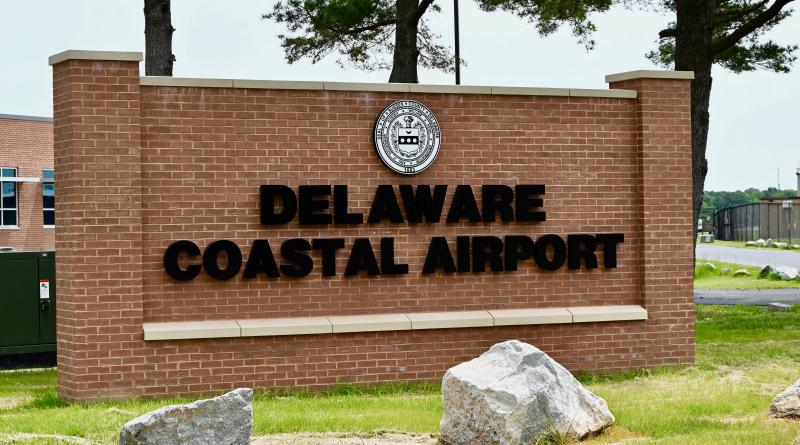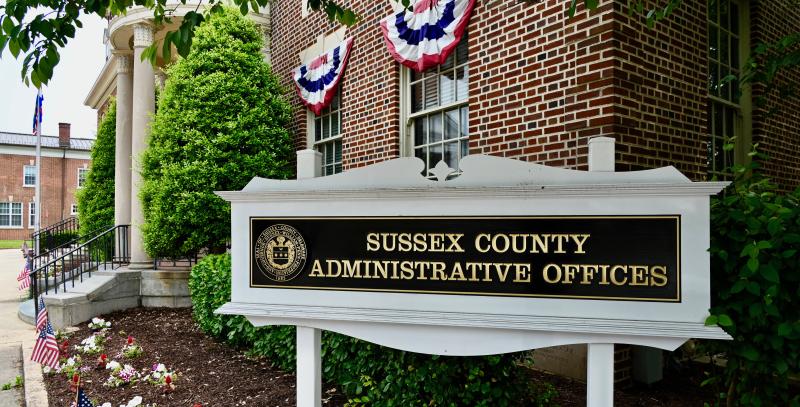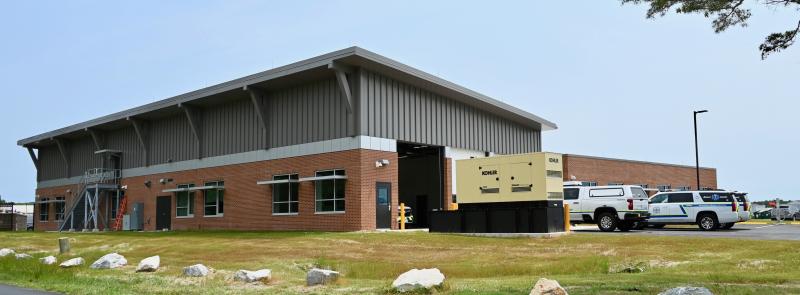Sussex budget reflects slowing home construction
Sussex County's proposed fiscal year 2024 budget of $278.6 million reflects a slight downturn in housing construction and rising costs associated with inflation.
On May 23, county officials unveiled the budget to fund a variety of local services, including 911 dispatchers, paramedics and other public safety, as well as pay for sewer expansions, continued open space preservation and a contribution for a new state park recreation project.
While the yearly plan is the third in a row for the county to near the $300 million mark, it is down $15 million, or 5.3%, from the current year as capital spending is down and federal funding from the American Rescue Plan Act cycles out. The property tax rate is unchanged.
Sussex County Council will hold a public hearing on the proposed budget at 10 a.m., Tuesday, June 20, in council chambers at the county administrative offices building, 2 The Circle, Georgetown. The public can comment on that date or submit comments at budget@sussexcountyde.gov.
To view a copy of the proposed budget, as well as the accompanying budget presentation, go to sussexcountyde.gov/county-budget.
Construction revenue down
Building-related revenue is forecast to decrease 9%, or $1.3 million, from the current fiscal year. Building permits have declined 9% over the past two years, with revenue from inspection fees down and recorder of deed documents down 4%.
The realty transfer tax, the county's main source of revenue, is forecast to decrease by $12 million to $31.5 million. In addition, County Finance Director Gina Jennings said, transfer taxes will provide 35% of total revenue, compared to 40% this year.
“We are back almost to pre-COVID numbers,” she said. “We are not sure how far it will go down, but we are monitoring it closely.”
The realty tax reached record highs in 2021-23, for more than $60 million in 2022 and $50 million in 2023.
The tax reached a low point in 2009-10, then continued a steady increase to 2023.
Building-related revenue peaked at nearly $20 million in 2021. Building permits also reached an all-time high in 2021, with more than 14,000.
County Administrator Todd Lawson said relying on the transfer tax presents a risk. “It's an issue we have to address. If it drops below budgeted numbers, we will have to seek other revenue sources from the public,” he said. “We are continuing our conservative approach to weather any situations, as we have done in the past.”
The county's biggest expenditures include the grant-in-aid program at $24.3 million, up 10%, and personnel costs at $44.7 million, up 4.9%.
Grant-in-aid supports a variety of county and community projects, with $10.7 million to public safety; $2.9 million to libraries; $2.6 million to economic development; $2.9 million to open space; and $1.7 million to community assistance, which includes human service grants, housing assistance, council and youth grants, and grants to CHEER and senior centers.
Public safety expenditures are $26.8 million in the proposed budget. The county has budgeted $4.1 million for additional Delaware State Police troopers; $805,000 in local law enforcement grants; and $5.7 million in fire and ambulance grants. There is also $15,000 included for Fenwick Island lifeguards and $200,000 for a fire-service study. Funding comes from realty transfer tax and a building permit fire service fee.
The proposed budget includes $89.7 million in the general operating fund, a 4.8% increase; $19 million in general fund capital projects, a 33% decrease; $52 million in the sewer fund, a 1.4% increase; $66 million in water and sewer capital projects, an 8.5% decrease; $1.8 million in the water fund, a 10% decrease; $10 million in the pension fund, an 8.4% increase; and $39.8 million in American Rescue Plan Act funds, a 12.1% decrease.
Nearly 40%, or $72.2 million, of capital projects are budgeted for work at Delaware Coastal Airport, including $32.5 million for the main runway extension to 6,000 feet and $13.6 million for taxiway B.
The budget also includes $21 million for an administration annex and $2 million for administration parking.
Revenue for capital projects is: $50 million, realty transfer tax reserves; $59.7 million, Federal Aviation Administration grant; $260,000, investment income; and $3.1 million in state funds.
Sewer capital projects total $66.1 million, including $11 million at the Inland Bays treatment facility, and $4 million at the South Coastal facility for upgrades and capacity expansion.
Funding is provided for 14 sewer district expansion projects, including $6 million for Slaughter Beach, $5 million for Long Neck communities, and $3 million for Herring Creek.
Highlights in the budget
• $66.1 million for wastewater infrastructure, including new sewer mains, increased treatment capacity and other upgrades to the county’s utility systems
• $7.4 million to preserve open space, including work at Hopkins Preserve near Lewes, and farmland that could otherwise be developed
• $3.4 million in funding to pay for the continuing court-ordered property reassessment
• $2 million for the design, planning, and construction of paramedic stations in the Dewey Beach, Lincoln, Millsboro and Milton areas
• Funding for three new positions to meet demand in the county’s wastewater operation, but the county general fund’s overall employee count remains unchanged due to departmental shifts; four additional paramedics are slated for hire next year
• $400,000 for a new mobile library
• A $1.5 million contribution to the state, using the county’s realty transfer tax reserves, for construction of an aquatic recreational facility at Trap Pond State Park near Laurel.
There will be no change in current property tax rates, though several fee increases are proposed, including $10 annually for sewer and $15 annually for unmetered water on public utility systems, as well as new and adjusted fees for a variety of engineering services.
Revenue for county government comes through a variety of sources, including property taxes, realty transfer taxes, building permits and other service fees.
Sussex officials hope to buy Justice of the Peace building
For years, Sussex County government has struggled with office space issues. In the proposed FY 2024 budget is $21 million for the possible purchase from the state of the soon-to-be-vacated Justice of the Peace Court adjacent to the county administration building on The Circle in Georgetown.
Jennings said purchase and renovation of the building would allow all staff at the west complex along Route 113 to relocate. “Because there are a lot of moving parts, it just keeps getting rebudgeted as an estimate until there is movement by the state,” she said. “We are waiting to see when the Family Court building gets finished and the JP Court is vacated. We don't have any agreement with the state to buy their building, but they have told us they have no need for it when they move to a larger facility.”
In addition, $2 million is budgeted to help with construction costs of a new four-story, 300-car parking garage as part of the new Family Court property near the county administration building. In exchange for the funds, 100 parking spaces will be reserved for county employees.
The new $115 million, 107,800-square-foot courthouse will replace an outdated 30,000-square-foot building not far away on The Circle that was built in 1988. Site work has started on the project at the intersection of Race and Market streets.
























































